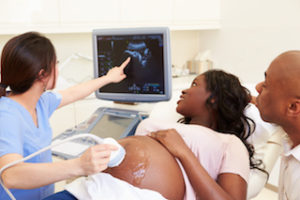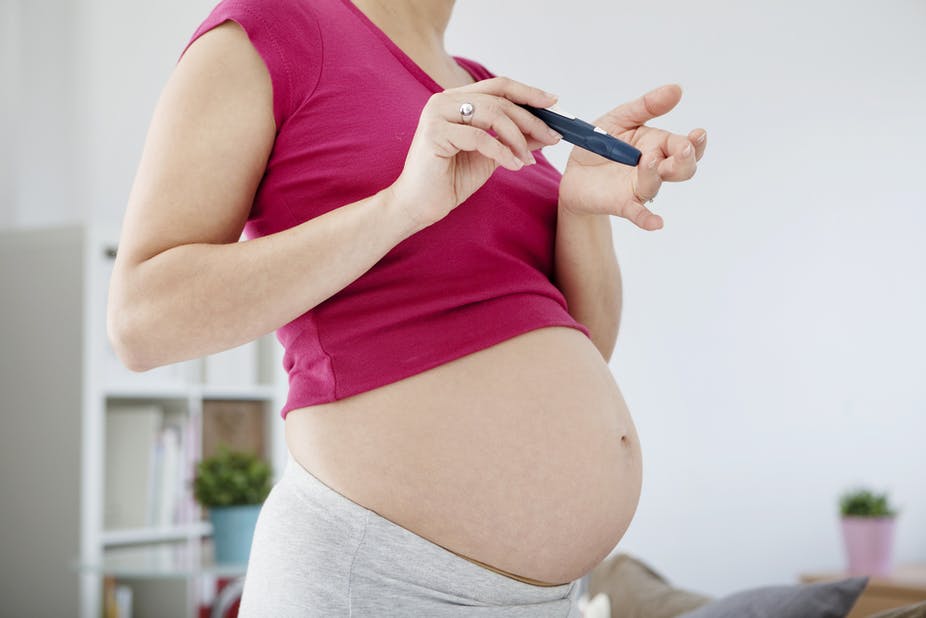Contents
What is Pregnancy Diabetes?
Although there is no direct relationship between pregnancy and diabetes, 2-10% of women worldwide develop pregnancy diabetes in their second trimester. There can be several causes for pregnancy diabetes.
During pregnancy, some women can experience high blood sugar levels (hyperglycemia). This increase in blood sugar levels is called Gestational diabetes mellitus or GDM. Similar to Type 1 and Type 2 diabetes, Pregnancy diabetes interrupts sugar/glucose metabolism. Which, as a result, leaves the body less capable of digesting carbs with the right amount of insulin. Women are most likely to experience pregnancy diabetes during the 24th to 28th week.
While pregnancy diabetes in the maximum number of cases remains undiagnosed, it can be identified if enough attention is paid. During the prenatal checkups, the doctors inquire about the familial history of chronic diseases. Sometimes pregnancy diabetes can cause complications during childbirth. It might lead doctors with no choice but to perform a c-section.
Pregnancy Diabetes and Diabetes Mellitus
Pre-existing diagnosis of Pregnancy Diabetes can increase the chances of development of Diabetes Mellitus or Type two diabetes up to 60% later in life.
Diagnosis of Pregnancy Diabetes in a mother can predict if the patient will have an early onset of type two diabetes. This is why it is crucial to tread with caution.
Signs and Symptoms of Pregnancy Diabetes
In most women symptoms of Pregnancy diabetes pass unnoticed. Which explains why it can be quite hard to detect. Even mothers themselves don’t realize that they have it. Sometimes these signs can be subtle and sometimes they are mistaken for side effects of pregnancy.
While all of this is true it is important to be closely monitored. Make sure that you report to the doctor if you experience any of these symptoms:
- Feeling tired easily
- Having blurred vision
- Getting thirsty excessively
- Urinating Excessively
- Snoring
Although these signs and symptoms are subtle leaning on the possibility that they shall pass is just not right. It’s always best to check in with your doctor. They will be able to assess the situation better and provide you with the course of treatment. They might even suggest lifestyle changes.
Causes of Pregnancy Diabetes
Causes of gestational diabetes can be multiple. It can be caused due to hormonal changes or other factors which make you predisposed and vulnerable to hundreds of other complications. You can find causes of Pregnancy diabetes in the next section. Usually, the hormonal changes lead to insulin imbalance in the body, which snowballs into pregnancy diabetes
Insulin Resistance
Sometimes even the cells stop responding to insulin which can tamper with the absorption of sugar and lead to a blood sugar level spike this can be especially dangerous in the long term and is called insulin resistance.
Human Plecental Hormones
There is an enormous flux of hormones in the body, resulting in all kinds of changes from haemorrhoids, heartburn, fatigue, lack of sleep to, in some cases, diabetes. high levels of hormones like:
- Human placental Lactogen
- Oestrogen
- Progesterone
- Human Placental Growth Hormone
These hormones reduce the effect of insulin which then leads to sugar accumulating in the body. As the pregnancy progresses the level of these hormones gradually increases. This increased concentration spikes up insulin resistance.
Human Plecental Lactogen (hPL)
Human pregnancies are a roller coaster of metabolic changes, sadly, these changes carry long-term implications on the body. For example, Human placental Lactogen is produced by the syncytiotrophoblast. Secretion of this hormone parallels the growth of the human placenta. hPL is as important to maternal development and fetal growth as Growth hormone is to human adults.
At the core, hPL increases insulin resistance in the mother’s body to make more glucose readily available for the foetus’ consumption.
It has been seen that Human Placental Lactogen levels elevate during pregnancy up to 30 times. This hormone plays a major role in the growth of the foetus.
Risk Factors of Pregnancy Diabetes
Several factors can contribute to Pregnancy diabetes which includes:
- Hypoglycemia or Hyperglycemia history
- Genetic predisposition towards diabetes
- Rapid weight gain during pregnancy
- Obesity and excessive visceral fat
- Miscarriages in the past
- Glucocorticoids consumption
- Polycystic Ovarian syndrome
- Ethnic groups like Native American, African, Asian and Hispanics are more prone to getting Gestational Diabetes
Diagnosis of Pregnancy Diabetes
If you have a higher BMI or excessive visceral fat then the chances of you getting diagnosed with gestational diabetes automatically increase. You could also be susceptible to Pregnancy Diabetes if you have a family history of Type 1 diabetes and Type 2 diabetes. This is why your doctor tests you for it in your initial prenatal visits.
Regardless of whether you feel the symptoms or no it’s important to get tested for your baby’s health and your own sake. These screening tests include:
Glucose Challenge Test
With the glucose challenge test, they measure your glucose levels one hour after you’re given a glucose solution. Sugar levels of 140mg/dL are considered normal. If your blood sugar levels surpass or are equal to 190mg/dL then you have gestational diabetes.
However, if your blood sugar levels are higher than the medically recommended levels, then the doctor will prescribe you to have another test.
With this follow-up test, you will be given an even more concentrated glucose solution. After which they will check your blood sugar levels every hour, for three hours. If your tests show an increased amount of blood sugar levels for the majority of the time then you have Gestational diabetes.
Treatment for Pregnancy Diabetes
Although for most patients symptoms of gestational diabetes disappear after childbirth, some have persistent symptoms. Gestational diabetes can even increase your chances of getting Type 2 diabetes post-childbirth. Here are some of the ways to improve your blood sugar levels:
Healthy Diet
Maintaining a nutritious diet acts as a shield and protects you from any chronic diseases such as hypertension and obesity. It is seen that poor nutrition leads to obesity which is the root cause of several other chronic and life-threatening anomalies such as stroke, heart diseases, and kidney failure. This is why you must pay close attention to your nutrition and even more so because your nutrition affects that of the baby. When you stick to a healthy and nutritious diet, it helps you maintain your mental health. It even keeps you well. You start feeling energetic and happy.
Nutrition has become important in today’s chaotic world. What contents should a nutritious diet comprise of? Well, a nutritious diet should include food and drinks with the right balance of macronutrients such as protein, fibre, and low carbs. They should also contain micronutrients such as vitamins and minerals. We understand that facing high blood sugar levels, maintaining a nutritious diet, and counting calories at the same time is an uphill battle. But you have to do this to live a long and healthy life.
Basic Workouts
During your first prenatal you should ask your doctor which workouts are suitable for you and if you should be working out at all, depending on your condition. For the sake of both the mother’s and baby’s health, it is recommended that you exercise at least 2.5 hours every week.
Regular exercising has a lot of benefits they can reduce your risks of complications during labor. Some doctors even suggest exercises to help with back pain and cramps.
Exercise can help prevent gestational diabetes to a great extent while keeping the mother at a healthy weight. It is required that the mother gains some weight during pregnancy but it’s important to keep in check that they don’t gain a lot of weight.
Exercise even prevents pregnant women from risk of Preeclampsia. It usually involves high blood pressure and potential damage to other organs like the liver or the kidneys. The condition usually arises in the 20th week of pregnancy. With symptoms involving:
- Weight gain
- Hypertension
- Oedema in some cases
Release your Stress
Stress is one of the leading causes of diabetes. It’s not just that stress can lead to complications in pregnancy like high blood pressure, but also premature delivery and underweight babies. Here are some of the ways you can decrease your stress.
Meditation
It has been around for over 5,000 years for a reason. Meditation works well for many people and has many benefits. It can lower stress, anxiety, and chronic pain. Meditation is also known to improve sleep, energy levels, and mood. Follow these steps to have an effective meditation session:
Find a quiet place
Get comfortable (sitting or lying down)
Focus your attention on a word, phrase, object, or even your breath
Let your thoughts come and go and do not judge them.
Yoga
Yoga is a form of exercise, but it can also include meditation. There are many types of yoga. The ones that focus on slow movement, stretching, and deep breathing are best for lowering your anxiety and stress.
Deep breathing
Mental stress activates your sympathetic nervous system, signalling your body to go into fight-or-flight mode. Deep breathing exercises can help activate your parasympathetic nervous system, which controls the relaxation response.
When you practice deep breathing, you turn on your system’s natural ability to relax. This creates a state of deep rest that can change how your body responds to stress. It sends more oxygen to your brain and calms the part of your nervous system that handles your ability to relax.
Close Monitoring

It is important to go for routine appointments with the doctors. They will not only monitor the growth and development of the foetus but also tell you how your increased blood sugar levels are affecting the baby.
Pregnancy diabetes can get out of hand quite easily. If you don’t go into labour at the due date or around it, then your doctor might have to induce labour.
After childbirth, you should keep up with your regular blood sugar level tests. Even though pregnancy diabetes usually goes away on its own, postpartum.
Childbirth Complications
Pregnancy and everything revolving around the process of childbirth is hypersensitive. While pregnancy diabetes can complicate it further it can also affect your baby. When your body does not produce enough insulin to digest all the sugar and glucose, it goes to your baby. Under normal circumstances, this is what helps your baby grow.
However, in Pregnancy diabetes, this accumulation of excess sugar in your body goes directly to the baby. Which can cause them to grow larger than usual. Other complications include:
- Asthma
- Jaundice and liver problems
- Premature birth
- Low Blood pressure
A Word From MantraCare
Do you want to get rid of diabetes? Join our online diabetes consultation program and reverse your Diabetes naturally through lifestyle changes such as a Personalized Diet plan, Exercise, dieticians, and health coaches.





